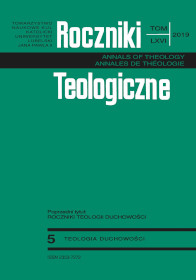Cała teologia w służbie integralnej formacji duchowej studentów
Abstrakt
Teologia jako rozumowa refleksja nad Bożym Objawieniem wciąż pozostaje w służbie wierze indywidualnego człowieka i wierze Kościoła, a przez to oddziałuje na społeczeństwo i doczesną rzeczywistość świata. Teologia ze swej natury musi oddziaływać na życie, przede wszystkim na codzienność samego teologa, jak również studentów. W ten sposób realizuje się formacyjny charakter studiowania nauk świętych.
Formacja obejmuje więc usłyszenie słowa zbawienia i jego asymilację w życiu, co prowadzi do myślenia i działania zgodnego z Ewangelią. Dlatego niezbędnym komponentem teologii pozostaje życie duchowe, zwłaszcza modlitwa, przyjmowanie sakramentów i uczestniczenie w codzienności Kościoła. Obejmuje to najpierw wykładowców teologii.
Realizację tych celów można osiągnąć przez kerygmatyczne nachylenie teologii, otwarcie na dialog oraz transdyscyplinarność. Świat dzisiejszy bowiem potrzebuje teologii odnajdującej się w meandrach myślenia współczesnych. Jednocześnie konieczne staje się, by absolwent studiów teologicznych swobodnie poruszał się po wszystkich przestrzeniach teologii, a nie pozostał na poziomie wąskich zainteresowań i specjalizacji. Ten wymóg współczesnych czasów domaga się więc od Kościoła nowego integralnego spojrzenia na teologię, uprawianą we wspólnocie wierzących oraz w kontekście świata coraz bardziej zsekularyzowanego. Czas wrócić do holistycznej wizji życia, świata, teologii.
Bibliografia
Benedykt XVI, Encyklika Caritas in veritate, Kraków 2009.
Franciszek, Adhortacja apostolska Evangelii gaudium, Kraków 20132.
Franciszek, Konstytucja apostolska Veritatis gaudium, Tarnów 2018.
Góźdź K., Teologia – Uniwersytet – Nauka w myśli Josepha Ratzingera/Benedykta XVI, „Studia Nauk Teologicznych” 3(2008), s. 101-118.
Heller M., Nowa fizyka i nowa teologia, Tarnów 1992.
Jan Paweł II, Encyklika Fides et ratio, Kraków 1998.
Jan Paweł II, Konstytucja apostolska Ex corde Ecclesiae, w: tenże, Dzieła zebrane, t. IV, Kraków 2007, s. 86-104.
Jan Paweł II, Konstytucja apostolska Sapientia christiana, w: tenże, Dzieła zebrane, t. IV, Kraków 2007, s. 15-31.
Kongregacja ds. Duchowieństwa, Kapłan głosiciel słowa, szafarz sakramentów i przewodnik wspólnoty w drodze do trzeciego tysiąclecia chrześcijaństwa, Poznań 1999.
Kongregacja Nauki Wiary, Instrukcja o powołaniu teologa w Kościele „Donum veritatis”, w: W trosce o pełnię wiary. Dokumenty Kongregacji Nauki Wiary 1966-1994, tłum. i opr. Z. Zimowski, J. Królikowski, Tarnów 1995, s. 353-369.
Międzynarodowa Komisja Teologiczna, Teologia dzisiaj. Perspektywy, zasady i kryteria, tłum. T. Stopa, Kraków 2012.
Pannenberg W., Kim jest człowiek?: współczesna antropologia w świetle teologii, tłum. E. Zwolski, D. Szumska, Paryż 1978.
Paweł VI, Encyklika Populorum progressio, Wrocław 1999.
Ratzinger J., Prawda w teologii, tłum. M. Wojalska, Kraków 2001.
Ratzinger J., Wiara – prawda – tolerancja. Chrześcijaństwo a religie świata, tłum. R. Zajączkowski, Kielce 20042.
Ratzinger J., Wiara i teologia w naszych czasach, w: Encyklopedia chrześcijaństwa. Historia i współczesność. 2000 lat nadziei, red. H. Witczyk, Kielce 2000, s. 15-22.
Seweryniak H., Miejsce teologii na Uniwersytecie w odpowiedzi na zarzuty, „Studia Nauk Teologicznych 3(2008), s. 63-78.
Sobór Watykański II, Deklaracja o wychowaniu chrześcijańskim, w: tenże, Konstytucje. Dekrety. Deklaracje. Tekst łacińsko-polski. Nowe tłumaczenie, Poznań 2008, s. 488-509.
Szymik J., Przyszłość i zadania teologii, „Warszawskie Studia Teologiczne” 30(2017), nr 2, s. 129-140.
Zasady formacji kapłańskiej w Polsce, red. K. Klauza, Częstochowa 1999.
Copyright (c) 2019 Roczniki Teologiczne

Utwór dostępny jest na licencji Creative Commons Uznanie autorstwa – Użycie niekomercyjne – Bez utworów zależnych 4.0 Międzynarodowe.





